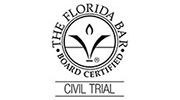Medical Negligence Litigation
Ted Babbitt has decades of experience holding medical professionals and institutions accountable for their mistakes or wrongdoing.
Award Winning Medical Negligence Litigation Attorney
Medical malpractice occurs when a health care provider (or a hospital) fails to render care that is in keeping with accepted medical techniques and principles. In other words, they fall below the reasonable standard of care for a given situation. Generally, this occurs when a doctor, nurse, or technician does something that is not in keeping with good practice, or fails to do something necessary for the patient's care.
Cases are handled on a contingent fee agreement. This means that should you recover an award or settlement, Ted's costs in developing the case are deducted from that. If you don't recover, you don't repay. The risk is Ted's. He takes it because of his belief in his abilities - and your case.
For a FREE consultation, fill out the contact form on this page. Ted has an office in West Palm Beach, Florida, and represents clients throughout the nation.
What is Medical Malpractice?
Medical malpractice occurs when a health care professional, such as a nurse or doctor, fails to provide a certain standard of care to a patient, resulting in harm, injury, or death. You must meet a few criteria to build a successful medical malpractice case, including:
- Failure to provide a certain standard of care
- Harm or injury resulting from negligence
- The injury does considerable damage (this could be constant pain, a substantial loss of income, suffering, or enduring hardship)
About Medical Malpractice Cases
Errors by professionals in the medical field can happen in almost any setting, and you can bring a malpractice case if those injuries are serious. To have a solid medical malpractice claim, you must be able to prove your medical malpractice injury is the direct result of a medical professional’s failure to act within the standard of care.
Doctors are not responsible for a medical accident unless they deviate from acceptable medical standards. To determine whether a doctor was negligent by deviating from the standard of care, experts in the doctor’s specialty must testify, under oath, that the doctor’s conduct fell below the care that would be deemed acceptable under the circumstances under which the patient was treated.
Notable Cases
- $10 Million: A settlement for a 2-year-old girl from Central Florida for a brain injury suffered during heart surgery. As a consequence of improper temperature monitoring, the child suffered serious brain damage. Discovery revealed that the surgeon had not operated on a child for nearly 20 years and that no one on the operative team had done this particular operation with any frequency.
- $9.45 Million: The combined settlements for our clients that were administered the drug during open heart surgery and subsequently suffered renal failure or death.
- $6.25 Million: A settlement for a man who suffered paralysis following the delay in diagnosis of a ruptured disc in his neck.
- $6.24 Million: An award for an infant who sustained a brain injury during a twin delivery, when the physician and nurses failed to recognize that the child was suffering oxygen deprivation after delivery of his brother.
- $6 Million: A verdict for the death of a mother as a result of surgical mismanagement of a urological procedure.
- $6 Million: A recovery for an alcoholic mother of two who was brain-damaged when she went into a seizure as a result of the d.t.’s. She was forced by the hospital to become sober “cold turkey” instead of being given Valium, which would have prevented the seizure.
- $4.25 Million: A settlement for a 42-year-old man who suffered a mild brain injury following surgery due to an overdose of anesthesia.
- $4 Million: A recovery as a result of the death of a 36-year-old Haitian dishwasher and mother of four. The patient suffered an embolic fluid air bubble while giving birth to her fourth child.
Defective Medical Devices FAQ
How do I know if I have a case?
What kind of defects can create a valid medical device case?
Medical & Hospital Negligence FAQ
What is medical malpractice?
Who can sue for medical malpractice?
Who can be sued for medical malpractice?
How long do I have to bring suit?
How common are malpractice cases?
Can I expect the same result in my case as in similar cases you list?
- How clear is the defendant's negligence? (Will it be viewed as an egregious error or as a reasonable medical complication?)
- How hard is it to prove the defendant's negligence? (How many medical experts will be required? How many medical specialties are involved?)
- What are the damages - and how hard will they be to prove? (Can the plaintiff show "hard damages" or is the harm intangible?)
- What sort of witnesses will the plaintiff and health care providers make? (Juries tend to help people they like.)
- What is the caliber of the attorneys representing the parties? (The best lawyers tend to get the best results for their clients. This applies to both sides.)
- Where is the venue? (The county in which the case must be filed and tried is a huge consideration. Many smaller communities in Central and North Florida, for example, have never seen a substantial verdict returned in a malpractice case. Others, meanwhile, have had very large verdicts.)
- Who is the judge?
- What are the legal issues presented?
What must I prove in my case?
- Negligence
- Proximate (immediate) cause
- Damages
How do I go about proving my case?
How long will my case take?
Will I have to attend court hearings?
How will I go about paying for your time and expenses?
Most medical malpractice cases - like other types of personal injury lawsuits - are handled on a contingent fee agreement. This means that we receive a percentage of any recovery you obtain as a result of the case, whether it be a verdict we win or a settlement we negotiate. It also means that if no recovery is achieved, you pay Ted nothing. His expenses work the same way. Should you recover an award or settlement, his costs in developing the case are deducted from that. If you don't recover, you don't repay us. The risk is ours. We take it because of his belief in his abilities - and your case.What kind of expenses are involved?
Types of Medical Malpractice
“Medical malpractice” is a general term that refers to one of many specific types. From surgical errors to misdiagnoses, let’s look at different forms medical malpractice can take.
Medical and Hospital Negligence
Medical (and hospital) negligence refers to a situation where a healthcare professional believes that they act in their patient’s best interest but provide care that results in harm or injury.
If a different “reasonably prudent” doctor would have done things differently, the healthcare professional in question may be guilty of medical negligence.
Surgical Errors
While all surgeries entail some level of risk, a surgeon is guilty of medical malpractice if they make an error that could have been prevented if they had followed the standard of care. For example, if a surgeon operates on the wrong body part, leaves a sponge inside the body, or cuts in the wrong location, they have not provided a proper standard of care.
Birth Injuries
This can refer to injuries sustained by a mother, a child, or both during the delivery. Acts of negligence may result in an injury to a mother or a child during this process, but wrongful birth is another factor to consider. Wrongful birth occurs when a doctor fails to inform parents of imminent or possible physical or mental congenital disabilities that would have made the parents avoid or end the pregnancy.
Medication Errors
Some medications come with side effects, but a doctor can also make serious medication errors that result in a malpractice lawsuit. If a doctor prescribes the wrong dosage or medication, or fails to check a patient’s drug allergies or conflicting medications, they may be guilty of malpractice.
Misdiagnosis of a Heart Attack
If a doctor misdiagnoses your heart attack as acid reflux or heartburn, you should speak to a lawyer. Heart attacks are commonly overlooked or misdiagnosed as other minor worries, resulting in serious injury or death.
Delayed Diagnosis/Misdiagnosis of Cancer
Delayed diagnosis refers to a situation where a doctor does not diagnose a patient within a reasonable amount of time. This can lead to weeks, months, or even years passing without obtaining the proper treatment, which can cause untold harm and suffering.
Plastic Surgery Malpractice
As plastic surgery is a choice, you may think that a surgeon cannot be held accountable for mistakes they make. Thankfully, this is not true. If a surgeon does not maintain a proper standard of care and a patient experiences scarring, nerve injuries, or infection, the surgeon may be guilty of malpractice.
Wrongful Death
Several of the examples above could lead to wrongful death, including misdiagnosis of a heart attack and delayed diagnosis of cancer. In the simplest terms, if a doctor fails to diagnose a patient or does not provide a proper standard of care and the patient dies, there may be a case for wrongful death.
As Seen In
"I have been graced by the help of this amazing attorney and his team. They successfully took on a Fortune 10 company on my behalf. They not only came into my home wishing to learn details related to my accident, but also took time to bond with my wife and I, reassuring us of our future."
– J. Perry, Client
Who Is Theodore Babbitt?
Ted Babbitt is the man you want to call if you believe you or a loved one has experienced any of the cases listed above. He’s won countless malpractice cases, garnered accolades and esteem, and has written over 100 articles for publications nationwide.











